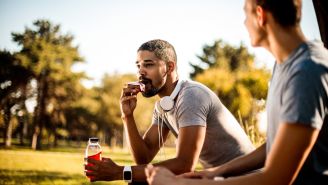Does this sound familiar? While rushing to answer an urgent call of nature, you plop down on a public toilet seat without looking at it first and yuck! Someone else has sprinkled the seat with pee and now you’ve sat in it. What’s the worst that could happen?
“You’ll get wet,” says Robin Miller, MD, a member of the Sharecare advisory board and co-author ofThe Smart Woman’s Guide to Midlife and Beyond. “And you’ll be grossed out.”
In fact, it makes more sense to talk about what won’t happen if you perch on a pee-splattered toilet seat. Here are some things you might worry about, but don’t need to:
- Bacteria. “Urine is sterile,” says Dr. Miller. “Even if someone has a bladder infection, the bacteria aren’t going to survive outside of the body.” So, for example, you aren’t at risk of contracting sexually transmitted diseases like chlamydia if you sit in pee. You have to have sex with someone who’s infected with the bacteria that causes it.
- Viruses. Bugs such as the herpes virus and HPV, the human papillomavirus that causes cervical and other cancers, “can’t survive outside the body,” says Miller. As with bacterial infections, the only way to become infected with one of these viruses is through intimate contact with an infected sexual partner.
- Human Immunodeficiency Virus (HIV). The risk of contracting HIV from a toilet seat is nil. “HIV only can be transmitted via blood or during sex,” says Miller. “And even if you happen to sit on menstrual blood left behind on a toilet seat, you aren’t at increased risk of infection.”
- Crabs (pubic lice). “You can’t get crabs from a toilet seat,” Miller says. According to the Centers for Disease Control and Prevention (CDC), the primary way these microscopic parasites are likely to hop on board your body is if you have close sexual contact with someone whose pubic or genital area is already infested. That’s because of the nature of the beast: crabs don’t have feet that would allow them to move or grab onto a smooth surface like a toilet seat, nor can they survive long outside of a warm human body.
As for dealing with your damp thighs, Miller says to just dry them off with clean toilet paper. If you aren’t rushing and spot pee before you sit, you can use a toilet seat cover to avoid getting wet.
Where germs lurk
This isn’t to say public bathrooms are totally devoid of health hazards. “These include the knobs on the sinks, the door to the restroom and the floor,” Miller says. “Never put your purse on the floor in a public bathroom.”
It goes without saying that you should wash your hands with soap. “Do this before putting on make-up, if you plan to do that,” she says. Avoid touching your mouth while in the loo. And, if you have a choice, “use a paper towel rather than a hot air blower to dry your hands. They blow bacteria all over the place.”
Miller notes that with the trend for gender-neutral bathrooms, it’s especially important to wash hands the right way. In one study, a team of researchers at Michigan State University observed the bathroom behavior of approximately 3,700 people in restaurants, bars and other public places. They found that half of the men who washed their hands didn’t use soap (reducing the amount of bacteria removed) and 15 percent didn’t wash at all. Women were more diligent in scrubbing up: about 78 percent used soap, and only 7 percent skipped the sink. Bottom line: Make sure you wash your hands—very thoroughly!






